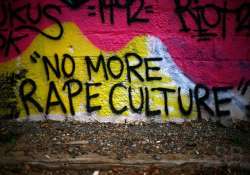India's 'rape culture' can be changed: Women authors
Washington, Jan 3: Two women authors, one Indian and the other American, believe that "India's rape culture" can be changed in the wake of the gang-rape and the subsequent death of a New Delhi student

"India has laws against rape; seats reserved for women in buses, female officers; special police help lines. But these measures have been ineffective in the face of a patriarchal and misogynistic culture," wrote Sonia Faleiro in an opinion piece in the New York Times.
"It is a culture that believes that the worst aspect of rape is the defilement of the victim, who will no longer be able to find a man to marry her - and that the solution is to marry the rapist," she added in the article on "The Unspeakable Truth About Rape in India."
"Change is possible," wrote the Indian author of "Beautiful Thing: Inside the Secret World of Bombay's Dance Bars." But "the police must document reports of rape and sexual assault, and investigations and court cases have to be fast-tracked and not left to linger for years."
"The volume of protests in public and in the media has made clear that the attack was a turning point," she wrote noting, "In retrospect it wasn't the brutality of the attack on the young woman that made her tragedy unusual; it was that an attack had, at last, elicited a response."
"Indians, it seems, have had enough," wrote Naomi Wolf, American author of "Vagina: A New Biography" in the Canadian daily Globe and Mail on "Ending India's rape culture" taking note of "dozens of large and increasingly angry demonstrations" over the gang rape.
"The deeper truth underlying the protests can be found on blogs, where young Indian men and women bemoan the fact that travel guidebooks routinely warn women about pervasive sexual harassment in India and advise them to move around in groups," she wrote.
"Movies, religion, music and women themselves are all blamed for male sexual violence against women, but rapists are not held responsible. A 'male-cosseting culture,' as one blogger put it, in turn supports a rape culture," Wolf wrote.
Noting "the connection between rape, male privilege and female sexual vilification was one of the key insights of feminists in the 1970s," she hoped "that the protests in India will inspire the West to emulate the protesters' lack of complacency."